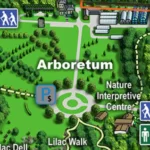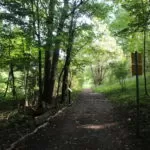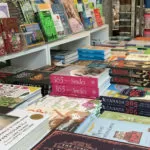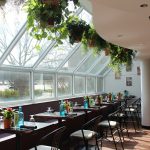| Membership | Price (+HST) |
|---|---|
| Single | $85/year |
| Single Plus | $120/year |
| Family | $130/year |
| Family Plus | $175/year |
| Contributing | $300/year |
| Supporting | $600/year |
| Sustaining | $1,000/year |
| Benefactor's Circle | $2,500/year |
| Director's Circle | $5,000/year |
| President's Circle | $10,000/year |
Botanicult Fiction: “This Plant Eats Bits of Meat!”
By Alex Henderson, Curator of Living Collections, Royal Botanical Gardens
Growing up in the north of England was frequently an austere experience spending my formative years living in a small provincial, working class, market town. The town exploded during the industrial revolution due to textile weaving and cloth manufacturing creating prosperity and an economic boom lasting from the Victorian era until the 1960’s when industry suffered a steep decline. As the town’s fortunes waned, I grew up surrounded by the dark satanic mills and the faded grandeur of the neo-gothic architecture for which the Victorians had such an unquenchable appetite. Its no wonder that surrounded by the ghosts of industry that my imagination was propelled into glorious technicolour, by exotic looking comic books. I immersed myself in the fantastic tales of Batman, Superman, Wonder Woman, Spider Man and a whole list of other characters. I also fondly remember the pages of adverts offering such exotic things as x-ray specs, rubber horror masks, miniature spy cameras, the world’s deadliest secrets of the Black Dragon Fighting Society and of course the impossibly alluring Hostess and Twinkie cup cakes (I still behave like one of Pavlov’s dogs at the mere mention of these enticing fancies!)
Imagine my surprise when recently re-reading a comic book dating from 1973 and noticing the availability of Venus fly traps (Dionaea muscipula) obtainable by mail order. The advert describes them as being the ‘worlds most unusual house plant’ and then even more excitingly, ‘this plant actually eats insects and bits of meat’. Believe it or not, the advert also contains a gushing testimonial from ‘famous botanist and explorer’ Charles Darwin! The reason this is so surprising is because in 2020 this would be illegal from a plant conservation standpoint. The International Union for the Conservation of Nature (IUCN) ranks this genus as being vulnerable in its natural habitat of North and South Carolina whilst the U.S. Fish and Wildlife Service recently reviewed it under the Endangered Species Act. D. muscipula also appears on the Convention on International Trade in Endangered Species of Wild Fauna and Flora (CITES) Appendix 2. The aim of this is to ensure that international trade in specimens of wild animals and plants does not threaten their survival. In 2018 D. muscipula was further described as being imperiled by NatureServe.
The harvesting of Venus fly traps has been illegal in North Carolina since 1956 which makes it all the more alarming to see them available for purchase via comic books 17 years after this law was enforced. Historically one of the major causes of population decline is cited as unlawful poaching and still today illegal cultivation occurs in greenhouses. In 2016 an article in the New York Times described the poaching of this plant as ‘a Venus flytrap crime ring.’
In conclusion, this presents a contradiction. Common tropes in comic books present superheroes as protagonists for good, possessing abilities and powers beyond those of you or I. These powers are harnessed to make the world a better place, protecting the public, fighting crime or preventing illegal activity. By historically indulging in less than ethical advertising practices in relation to plant conservation legislation, this results in entirely undermining the noble actions, ethics and morals of the superheroes we celebrate. This conflict of interest is the equivalent of creating a proverbial comic book parallel universe. What a paradox!
Now then, I think I mentioned cup cakes so with the greatest of alacrity, and if you will beg my pardon, it is about time I improved my own personal cake eating superpowers. Mr. Pavlov, without further a do, kindly ring that bell. Woof, woof!

Botanicult Fiction is an affectionate review of plants in pop culture viewed through the lens of plant nerds and curated for your reading or viewing pleasure during this challenging time of COVID-19.
More from the RBG Blog
Check out RBG’s blog for announcements, articles, and more from Canada’s largest botanical garden.
Want to be sure you hear first? Sign up for our weekly e-newsletter to hear about upcoming events, weekend activities, articles, and more!












